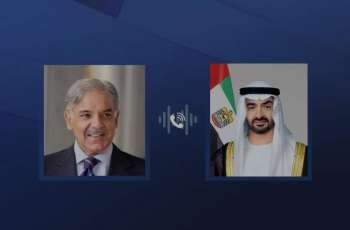MOSCOW (Pakistan Point News / Sputnik - 26th April, 2021) Russian President Vladimir Putin's proposal on the concept of the conflict-free environment is undoubtedly logical, as Moscow has to deal with significant forces that could be used against it, experts told Sputnik, adding that Washington should be agreeing to all kinds of negotiations and, ideally, any US-Russia talks should start with nuclear weapons.
In his annual address to the parliament on Wednesday, Putin said that Russia was inviting the global community to discuss strategic stability and create an "environment of conflict-free existence." The negotiations could aim at creating an area for conflict-free cooperation on the basis of a security formula that would cover not only traditional strategic weapons, such as intercontinental ballistic missiles and heavy bombers and submarines but all offensive and defensive systems capable of performing strategic tasks, according to the Russian leader.
Later, the Kremlin said that the concept of a conflict-free environment could be discussed at a potential summit of permanent member states of the United Nations Security Council (UNSC).
China has already reacted to Putin's offer, expressing its readiness to discuss a wide range of issues related to global strategic stability with all sides. Beijing also reaffirmed its support for Russia's initiative to convene a summit of the heads of the UNSC's five permanent member states.
POSSIBLE TO KEEP BRIDGES, ENTER ARMS CONTROL TALKS
The proposal of the Russian president is undoubtedly logical, Nikolai Sokov, a senior fellow at the Vienna Center for Disarmament and Nonproliferation, told Sputnik.
"Russia has to deal with significant forces that could be used against it and it does not matter for its security whether these forces are based on the other side of the globe or next to its borders. Translating this into a legally binding agreement will hardly be possible, however, or at least not easy," he explained.
Sokov believes that there is a greater chance that Washington and its allies will agree to talk about long-range precision-guided conventional weapons, which have been a source of Russian concerns for decades.
"Now that Russia has such weapons, too, there is plenty of low-key discussion in Washington and Brussels about ways to somehow limit the newly acquired Russian capability, which is regarded as a threat to the US and NATO (the US always resisted negotiations on such weapons while it enjoyed a near-monopoly for a quarter of a century)," he said.
The same concerns missile defense, the analyst believes. Russia actively works on its own defense capability and it is possible that the United States "will finally abandon its traditional resistance to putting them on the negotiating table," he noted.
When Putin spoke of a "conflict-free coexistence," he implied that Russia should be recognized as a strong decisive state that cannot be pushed around, Dr. Heinz Gaertner,� who is a lecturer for Political Science at the Universities of Vienna and Krems, told Sputnik.
"Russia would have sufficient military resources to defend its interest. From this basis it would be possible to keep the bridges and enter arms control negotiations. This means that there are political conditions for arms control," Gaertner, who is also a chair of the Advisory Committee for Strategy and Security Policy of the Scientific Commission at the Austrian Armed Forces, said.
The idea of "conflict-free coexistence" opens the prospect to identify areas of cooperation and they may cover not only arms control, but also confidence and security building measures and regional issues, according to the expert.
"Potential examples for such conflict-free areas are climate change, the Iran nuclear deal, and an enhanced treaty on strategic nuclear weapons. It should be extended to East-Central Europe, Afghanistan and Syria. The creation of neutral states where there are conflicting interests should be considered, like Afghanistan, Ukraine or Georgia," he suggested.
GETTING ALL PIECES TOGETHER TO BE HARD WORK
Meanwhile, Sokov admits that getting all pieces together, especially when it concerns many nations would be hard.
"I suppose the first step would be to discuss greater transparency and predictability of nuclear and long-range conventional forces as well as missile defense. Traditionally - at least in the last two decades - Russian concern about US missile defense has not been so much about the fact that the US is working on it, but rather a complete lack of clarity about the future capabilities of such systems in the next 10-20-30 years," he said.
According to Sokov, the arms race is fueled by "an unpredictable environment."
"...It is hardly by chance that the vast majority of new weapons Russia has been developing and has begun to deploy are configured to penetrate the possible future American missile defense," he said.
When taking into account any potential nuclear negotiations, Sokov proposed a two-level deal.
"A new US-Russian treaty on nuclear weapons with 'hard' numbers and a multilateral arrangement that provides for transparency and predictability measures. After all, the United Kingdom, France, and China have low numbers and it is more important to ensure that they remain low (the British decision to increase the size of its nuclear stockpile and no longer disclose its size is very unfortunate and goes against the future of arms control - a multilateral transparency and predictability arrangement should be able to prevent this)," he said.
More problems may arise with other nuclear states, such as India, Pakistan, North Korea and Israel.
"No one knows how to deal with them. The issue is not only substantial but also political because they are not parties to the Nonproliferation Treaty and are 'unofficial' nuclear states. Recognition of their role could undermine the global nonproliferation regime," he concluded.
Gaertner similarly believes that the idea to include several weapon-systems is "challenging at least."
"Involving other nuclear weapon states besides the USA and Russia, like China, France and the UK seems not to be likely because of the existing asymmetries of their nuclear arsenals. [Former] US President [Donald] Trump suggested already arms control negotiations with the inclusion of strategic and tactical nuclear weapons of the US, Russia and China. This approach was doomed to fail," he said.
The United States should be agreeing to all kinds of negotiations in such areas as weapons in space, cyberwarfare, missiles of all classes and nuclear weapons and, ideally, any US-Russia talks should start with nuclear weapons, Tony Robinson, the director of the middle East Treaty Organization and a member of the Coordinating Committee of the Abolition 2000 global network to eliminate nuclear weapons, told Sputnik.
"The two countries hold 90% of the world's nuclear weapon arsenal and the risk of accidental nuclear war is not zero, meaning that one day it will happen. That's without even imagining what could happen if the situation in Ukraine escalates further, something that appears to be happening as we speak," he said.
Robinson recalled huge amount of money Washington spends on its military complex and added that the country has no intention of agreeing to reduce anything at the moment.
"Negotiating a huge reduction in nuclear weapons between these two countries would then give the United States and Russia the moral authority to call all the other nuclear weapons states, including those who are not signatories to the NPT [Treaty on the Non-Proliferation of Nuclear Weapons], in order to negotiate final nuclear disarmament, something which they've already agreed to do back in 1970!" he said.
He was referring to the NPT treaty which entered into force in March 1970 and said that each party "undertakes to pursue negotiations in good faith on effective measures relating to cessation of the nuclear arms race."
"It is thus incumbent on the USA to show good faith by reducing its military spending, by engaging in good faith negotiations to reduce the role of nuclear weapons in its security doctrine and by actually talking to the world's leading powers about how to eliminate all classes of weapons," Robinson concluded.
Yet, Miles Pomper, senior fellow in the Washington DC office of James Martin Center for Nonproliferation Studies, believes that it is highly unlikely that any of the other nations would agree to the idea proposed by Putin and issues like parameters and membership will not even be addressed.
"There is little support in the US Congress for any treaty provisions regarding missile defense so the Biden administration would not agree to this. China has not been willing to agree to any arms control negotiations at all, and the UK and France have historically resisted being included in arms control negotiations," he told Sputnik.
He added that the US will likely be keen on ensuring that all nuclear warheads, both strategic and nonstrategic, are included since Russia has more of these.
According to the statistics portal Statista, as of January 2020, Russia had 6,375 nuclear warheads, while the US had 5,800.



